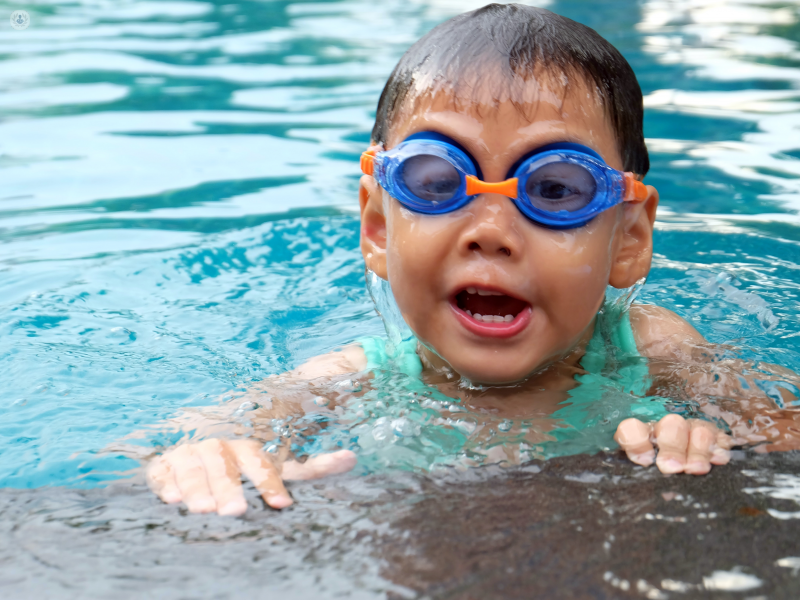Why my child keep getting swimmer's ear
Escrito por:Swimmer's ear is all too common in children who spend a lot of their time in the water, particularly in the summer months. While most infections self-resolve, some kids experience recurrent infections which need extra care and attention to prevent further problems developing.
London-based consultant paediatric ENT surgeon, Mr Christopher Pepper, provides us with an overview of swimmer's ear and the steps to take to help resolve it.

What is swimmer's ear?
Swimmer's ear, also known as otitis externa, is an infection of the skin of the ear canal. The ear canal skin extends from the outer ear down to the eardrum.
Most of these infections are caused by bacteria, although they can also be caused by a fungus or rarely, a virus.
Water in the ear or minor trauma to the ear canal skin are the most common reasons for the infection to start.
How does swimmer's ear happen?
When the skin of the ear canal is healthy it forms a natural barrier with the help of ear wax (also called cerumen) to prevent bacteria spreading into the skin and causing an infection. However, if the ear is wet (from bath or swimming pool water), or there is a crack in the ear canal skin (for example from cotton buds or eczema) then bacteria can spread into the skin and multiply, causing unpleasant symptoms.
How do I know if my child has swimmer's ear?
Swimmers ear often starts with more mild symptoms, including an itchy ear, discomfort when lying on that side, redness of the skin or some discharge.
If the infection progresses, the pain and itchiness can increase, with a blocked ear sensation and muffled hearing. Sometimes, the infection can be severe with redness and swelling on the outer ear and skin of the face, a temperature, and complete blockage of the ear canal.
Does swimmer's ear need antibiotics or will it go away on its own?
Swimmer's ear may self-resolve if the symptoms are mild for 1 or 2 days. Calpol and Neurofen can be used safely during this period. However, antibiotic ear drops are often needed to resolve the infection.
If the infection is due to a fungus, then antifungal ear drops would be needed. Oral antibiotics are usually of little help in swimmer's ear unless there is a significant infection spreading onto the ear or face, or your child feels unwell.
Why does my child keep getting recurrent swimmer's ear?
Some children suffer from recurrent swimmer's ear, and for most, there is an underlying cause which can be improved or resolved.
- Swimming or bath time can allow water into the ear, creating a damp environment for bacteria to multiply.
- The regular use of earbuds and hearing aids can make the ear canal more humid and increase the risk of infections.
- Underlying skin conditions such as dry or flaky skin and eczema can make infections more likely.
- The use of cotton buds to clean the ear is a common cause, as although they seem soft, they actually cause very small scratches to the ear canal skin. This allows bacteria to spread into the skin and cause an infection.
Can swimmer’s ear be prevented?
Preventing or reducing swimmer's ear is possible by reducing the risk factors. These tips are what I find most successful:
- Allowing the ears to clean themselves without using cotton buds
- Keep the ear dry, with earplugs or a swim cap for swimming, or cotton wool smeared with Vaseline for the bath
- Avoid scratching the ear
- Prevent trapped water in the ears by removing excess wax by an ENT surgeon. Prevent further wax build-up using Earol spray to soften the underlying skin and wax
- Treat underlying skin disorders in the ear such as eczema
- Avoid skin irritants/allergens, such as specific shampoo or conditioners which may irritate the skin
When can my child return to swimming?
It is advisable to wait until the ear has healed and is dry and comfortable before swimming again. As the water encourages the growth of bacteria, the infection should be treated completely before swimming again.
When should I take my child to see a doctor?
You should seek medical attention soon after the symptoms start, and particularly if they are not improving after 1 or 2 days. If the symptoms are more severe you should see your doctor urgently.
If you are worried about your child's ear infection, make an appointment with Mr Christopher Pepper through his Top Doctors profile.


